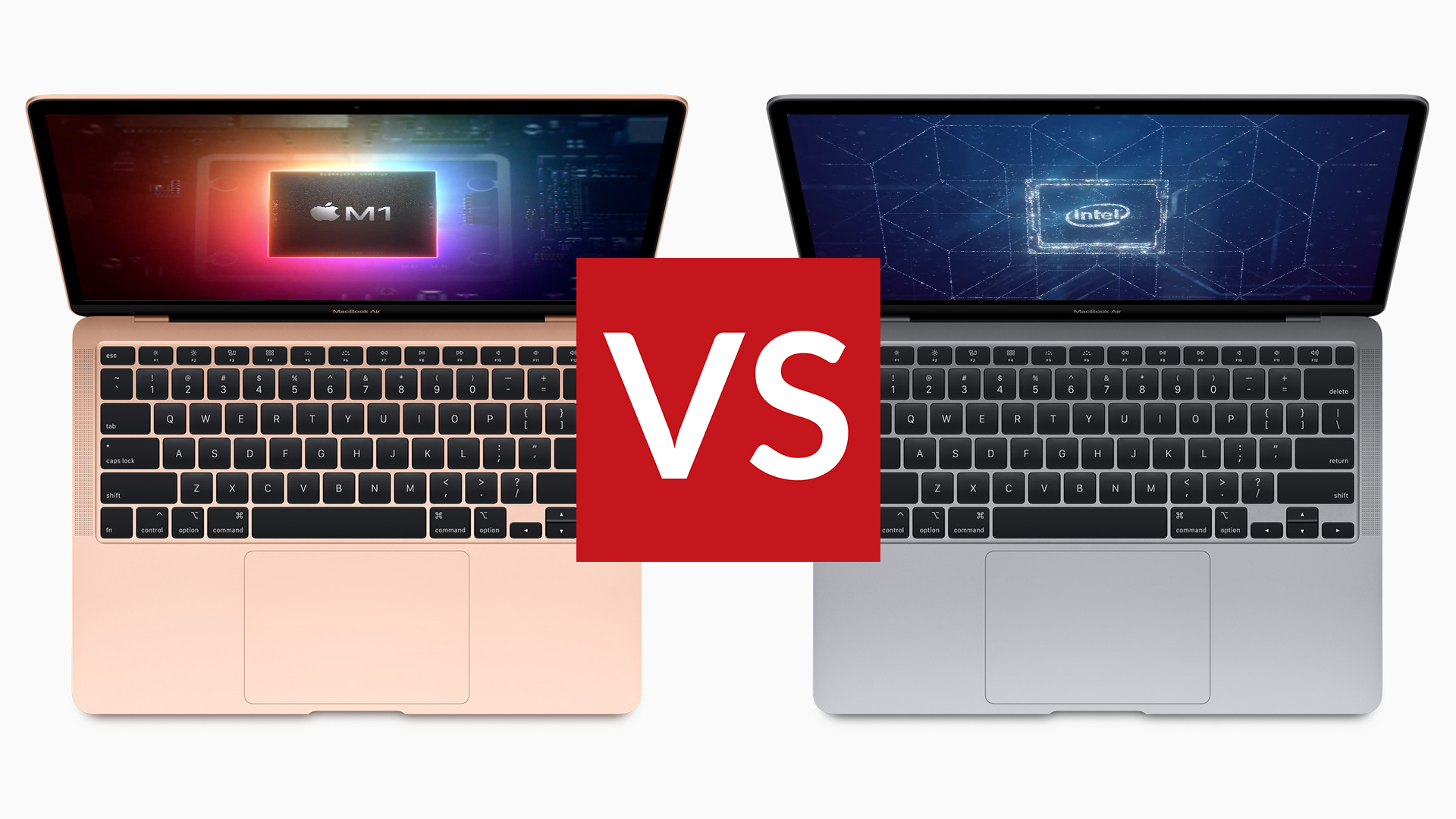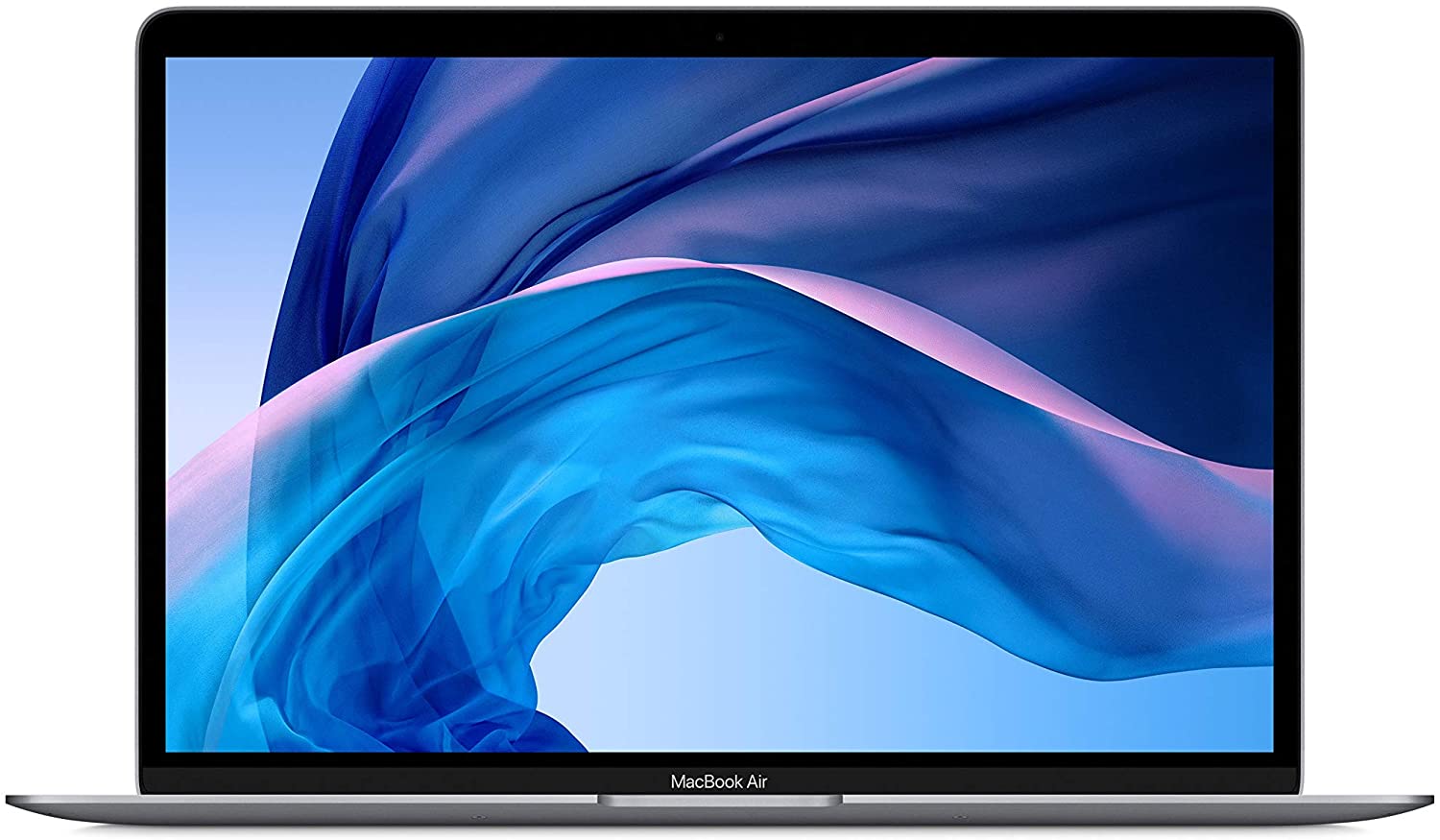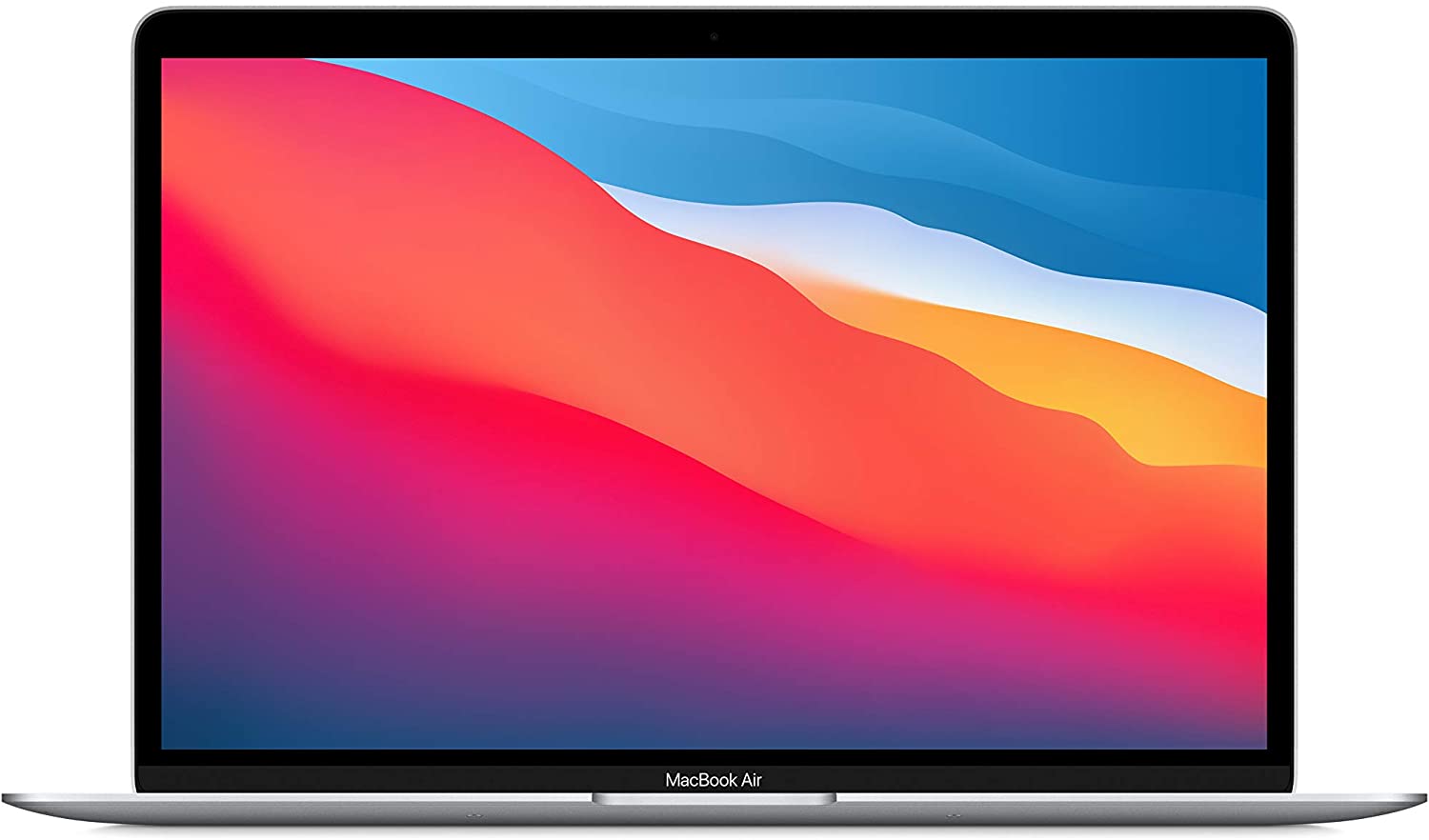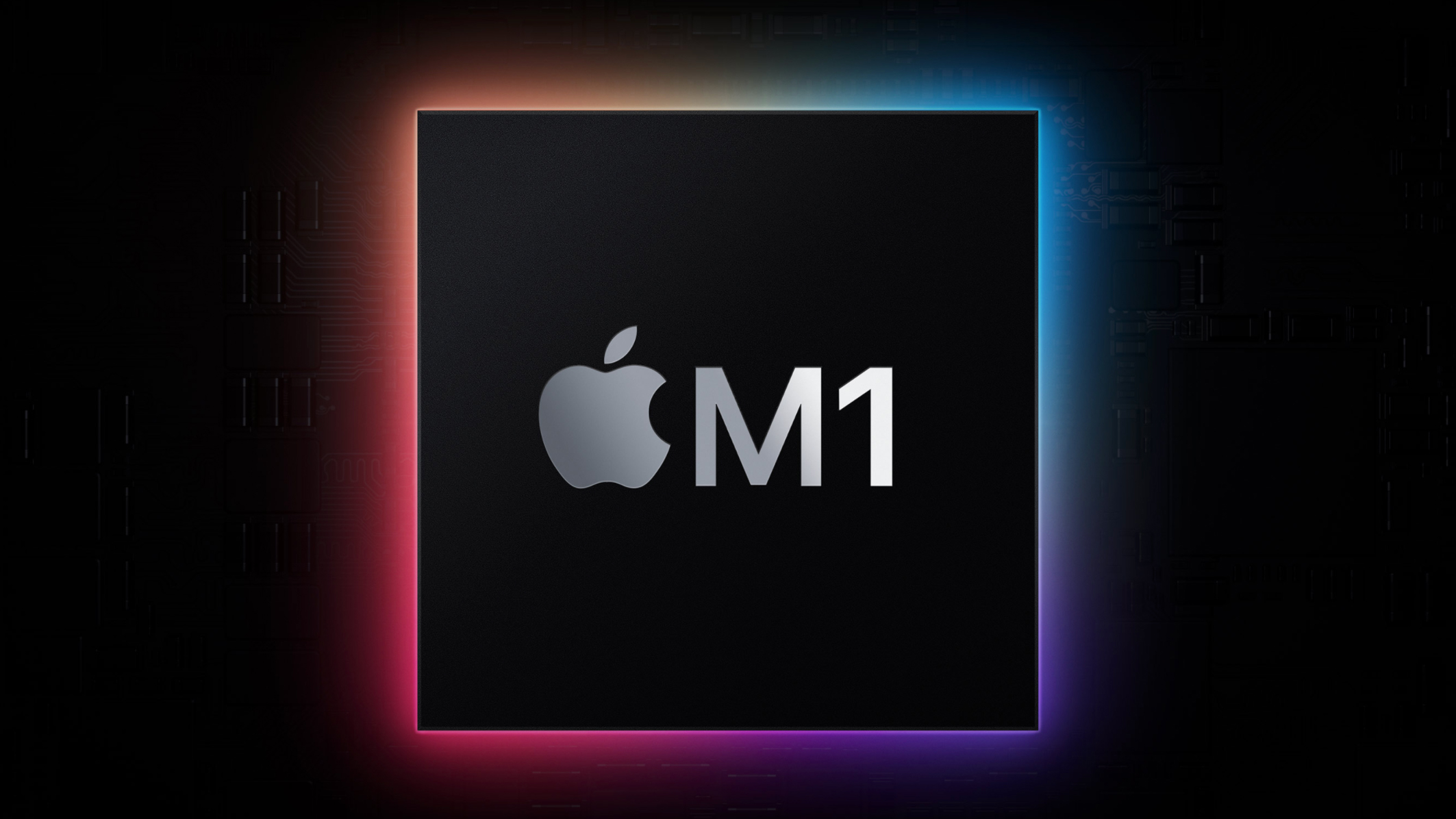MacBook Air M1 vs MacBook Air Intel 2020: how the two compare
Released months apart, could the two MacBook Air laptops really be all that different? In terms of power, definitely, if Apple’s M1 chip has anything to say about it


Apple released not one but two MacBook Airs this year, and if you're looking to buy now, you're probably looking at the MacBook Air M1 vs MacBook Air Intel and wondering what the difference is. While Apple only sells the M1 version now, the Intel version is still available all over other stores, and both have rated among our picks of the best lightweight laptops.
Only months after releasing the Intel-powered MacBook Air 2020 with more powerful internals, bigger storage capacity, and a £100/$100 drop in price from the 2019 model, Apple couldn’t help itself, and reinvented its thinnest and lightest laptop on the inside with a revolutionary new M1 chip made by Apple to replace the Intel processor.
• MacBook Air M1 vs MacBook Pro M1 – Apple's new laptops go head to head
The result is breathtaking. Releasing the MacBook Air M1 is certainly a brilliant move on Apple’s part, with the laptop being not only the most powerful Air to date – not to mention the longest-lasting when it comes to battery – but also one of the most powerful laptops of any kind. All while inheriting its predecessors’ improved features like the Magic Keyboard and Bluetooth 5.0 connectivity. And, it’s certainly a better proposition for the same price.
Then again, the MacBook Air 2020 has something going for it that its albeit more powerful successor doesn’t: an even cheaper price tag. With the MacBook Air M1 being the newest model, remaining stock of the MacBook Air 2020 has been dropping in price in the latest MacBook Air deals. That makes it an appealing option for the budget-minded, which is the line’s target market in the first place.
- Meet the best laptops of all kinds
- How about the best student laptops
- Don't miss the best MacBook Air deals
- And the best MacBook Pro deals
MacBook Air M1 vs MacBook Air 2020: Price

When it first came out, the MacBook Air 2020 cost £999/$999/AU$1,599 for its base model, offering a nice £100/$100/AU$100 price drop from the 2019 model for more powerful specs and double the storage, among other improvements. The higher-end model, on the other hand, was priced at £1,299/$1,299/AU$1,999.
The MacBook Air M1 dropped at the same price point for the base model. However, its higher-end model is priced at £1,249/$1,249/AU$1,949. Both models tout Apple’s M1 chip, giving it even better performance and much-improved battery life. That makes it the better – perhaps even the obvious – choice for many people looking for power and value.
Get all the latest news, reviews, deals and buying guides on gorgeous tech, home and active products from the T3 experts
On the other hand, with the MacBook Air M1 taking on the mantle as Apple’s thinnest and lightest, the MacBook Air 2020 is already dropping in price, with stores like Amazon and Best Buy offering their remaining units for £100/$100 less. So, while the MacBook Air M1 may offer better value due to its price to performance ratio, the MacBook Air 2020 makes for an attractive choice for those who could use that extra bit of cash for something else.
MacBook Air M1 vs MacBook Air 2020: Design and features

There’s effectively no visual difference between the MacBook Air M1 and the MacBook Air 2020. Though Apple could have taken the opportunity to give the Air M1 a complete overhaul, it played it safe, giving it the same body and design as the Air 2020.
Both have the same 0.41–1.61x30.41x21.24cm dimensions and 1.29 kg weight, even though the Air M1 has the more compact Apple components inside. They both have a 13.3-inch 2560x1600 LED-backlit Retina display (though the M1 Mac supports the wider P3 colour gamut), 720p camera (though the M1's is slightly better), wide stereo speakers with Dolby Atmos support, Touch ID sensor, Force Touch trackpad, and that Magic keyboard that replaces those horrible-all-around Butterfly keyboards from 2019 and prior. And, they both come in Gold, Silver, and Space Grey colours.
The only thing that’s different when it comes to design is something most of us won’t notice: instead of the Air 2020’s two Thunderbolt 3/USB-C ports, the new Air M1 has opted for two Thunderbolt 4/USB-C ports instead. If that sounds foreign to you, it’s because it’s new, so new that only the late 2020 generation of Macs and MacBooks as well as Intel 11th Gen Tiger Lake laptops have it.
This next-generation port promises faster transfer speeds and improved video bandwidth management. However, to the less discerning, this change probably won’t matter as much – especially because these ports on the Air M1 are backwards compatible with Thunderbolt 3.
In any case, this lack of design updates may be great news to folks who love the Air 2020 design, as well as those Air 2019 and earlier owners who desperately need to move on from those Butterfly keys.
However, if you’re looking for a massive redesign on your next MacBook Air and you already have the MacBook Air 2020, you’re probably better off waiting until Apple finally decides to make more drastic changes.
MacBook Air M1 vs MacBook Air 2020: Specs and performance

While the design remains largely unchanged, Apple has gone through great lengths to improve the MacBook Air’s internals. Make no mistake: the MacBook Air 2020 was already a capable laptop in its own right, rocking Intel’s 10th generation processors as well as Iris Plus Graphics and faster LPDDR4X RAM.
In addition, it also helped usher in the new era of bigger storage space in MacBooks, which has always been a bit of a sore spot. Previously, MacBook Air laptops started with 128 GB or 256 GB of space, depending on the configuration. Anyone looking to upgrade it would have had to pay a steep price.
The MacBook Air 2020, on the other hand, doubled its starting storage space to 256GB and 512GB, again depending on the configuration. It saves a lot of MacBook Air buyers from having to pay the upgrade costs – though bigger storage upgrades are still very much on hand for those who absolutely need more space.

The MacBook Air M1 has, thankfully, inherited these storage space changes, just as it did the Air 2020’s Bluetooth 5.0 connectivity. However, it also brings to the table a fresh batch of innards – and by fresh, we mean fresh from Apple’s own oven.
Abandoning Intel chips, this next-generation of MacBook Air laptops now use Apple’s new M1 chip, which comes with an 8-core CPU and an integrated 7‑core or 8-core GPU. Based on tests so far, it's anywhere between twice as fast and over three times as fast as the previous MacBook Air, and is actually on par with 16-inch MacBook Pros. It's a Bugatti hiding in the body of a hatchback, basically.
The graphics chip also looks to be on the same level as lower-end discrete GPUs from Nvidia, which is also a huge, huge step up from what came before.
And, so far, its performance has been quite ground-breaking while maintaining better power efficiency. That means that the MacBook Air M1 also has longer battery life – up to 18 hours of video playback, to be exact. That’s certainly a huge improvement over the Air 2020’s 12 hours.
The new version of macOS, Big Sur, is capable of running applications built specifically for the M1 chip, but can also translate legacy apps built for Intel-based MacBooks to run on it, and because the machine is so fast, these still faster than almost any other laptop. And because the chip is the same basic type as is used in the iPhone and iPad, you can also run iOS or iPadOS apps and games on the M1.
MacBook Air M1 vs MacBook Air 2020: Verdict
In terms of design, some MacBook Air users might be disappointed that Apple hasn’t given the MacBook Air M1 a proper update beyond the next-generation ports and slightly upgraded screen. We'd particularly like to see the bezels around the screen slimmed in the future, boosting screen size to 14-inch or so.
However, when it comes with the new M1 chip, you're getting not just a leap forward in performance, but also longer battery life, cooler operation, and a whole lot of versatility when it comes to the apps it can run. That isn’t to say that the Intel MacBook Air 2020 wasn't perfectly capable, but that new silicon from Apple turns its lightest and thinnest laptop into a machine capable of handling even high-end software.
So, when choosing between the MacBook Air M1 and its predecessor, the MacBook Air 2020, it boils down to what your needs are and how much you’re willing to pay.
With the Air M1 on the shelves, the Air 2020 laptops are dropping in price, and you could save 10-15% of the price, which you can use for something else – a new MacBook accessory, perhaps. If budget is a major factor in your decision, and you really don’t need that boost in power that the M1 chip offers, the MacBook Air 2020 is worth a serious consideration.
However, if your budget is flexible, and you’d rather get the best value for your money, the internal upgrades that the MacBook Air M1 brings to the table is well worth paying full price for.

Michelle Rae Uy is a tech and travel journalist, editor and photographer with a bad case of wanderlust. She is a regular contributor for IGN, TechRadar and Business Insider, and has contributed to Thrillist, Paste Magazine, Nylon, Fodor's and Steve's Digicams. Living mainly in California with her adorable cats, she splits her time between Los Angeles, London and the rest of the world.